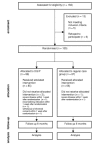The design of the Dutch EASYcare study: a randomised controlled trial on the effectiveness of a problem-based community intervention model for frail elderly people [NCT00105378]
- PMID: 16207382
- PMCID: PMC1298295
- DOI: 10.1186/1472-6963-5-65
The design of the Dutch EASYcare study: a randomised controlled trial on the effectiveness of a problem-based community intervention model for frail elderly people [NCT00105378]
Abstract
Background: Because of their complex clinical presentations and needs frail elderly people require another approach than people who age without many complications. Several inpatient geriatric health services have proven effectiveness in frail persons. However, the wish to live independently and policies that promote independent living as an answer to population aging call for community intervention models for frail elderly people. Maybe models such as preventive home visits, comprehensive geriatric assessment, and intermediate care qualify, but their efficacy is controversial, especially in frail elderly persons living in the community. With the Dutch EASYcare Study Geriatric Intervention Programme (DGIP) we developed a model to study effectiveness of problem based community intervention models in frail elderly people.
Methods/design: DGIP is a community intervention model for frail elderly persons where the GP refers elderly patients with a problem in cognition, mood, behaviour, mobility, and nutrition. A geriatric specialist nurse applies a guideline-based intervention with a limited number of follow up visits. The intervention starts with the application of the EASYcare instrument for geriatric screening. The EASYcare instrument assesses (instrumental) activities of daily life, cognition, mood, and includes a goal setting item. During the intervention the nurse regularly consults the referring GP and a geriatrician. Effects on functional performance (Groningen Activity Restriction Scale), health related quality of life (MOS-20), and carer burden (Zarit Burden Interview) are studied in an observer blinded randomised controlled trial. 151 participants were randomised over two treatment arms--DGIP and regular care--using pseudo cluster randomisation. We are currently performing the follow up visits. These visits are planned three and six months after inclusion. Process measures and cost measures will be recorded. Intention to treat analyses will focus on post intervention differences between treatment groups.
Discussion: The design of a trial evaluating the effects of a community intervention model for frail elderly people was presented. The problem-based participant selection procedure satisfied; few patients that the GP referred did not meet our eligibility criteria. The use of standard terminology makes detailed insight into the contents of our intervention possible using terminology others can understand well.
Figures
Similar articles
-
Design of a randomized controlled study of a multi-professional and multidimensional intervention targeting frail elderly people.BMC Geriatr. 2011 May 14;11:24. doi: 10.1186/1471-2318-11-24. BMC Geriatr. 2011. PMID: 21569570 Free PMC article. Clinical Trial.
-
A randomized study of a multidisciplinary program to intervene on geriatric syndromes in vulnerable older people who live at home (Dutch EASYcare Study).J Gerontol A Biol Sci Med Sci. 2008 Mar;63(3):283-90. doi: 10.1093/gerona/63.3.283. J Gerontol A Biol Sci Med Sci. 2008. PMID: 18375877 Clinical Trial.
-
Cost-effectiveness of a multidisciplinary intervention model for community-dwelling frail older people.J Gerontol A Biol Sci Med Sci. 2008 Mar;63(3):275-82. doi: 10.1093/gerona/63.3.275. J Gerontol A Biol Sci Med Sci. 2008. PMID: 18375876 Clinical Trial.
-
Preventive home care of frail older people: a review of recent case management studies.J Clin Nurs. 2004 Sep;13(6B):112-20. doi: 10.1111/j.1365-2702.2004.01054.x. J Clin Nurs. 2004. PMID: 15724826 Review.
-
Toward the realization of a better aged society: messages from gerontology and geriatrics.Geriatr Gerontol Int. 2012 Jan;12(1):16-22. doi: 10.1111/j.1447-0594.2011.00776.x. Geriatr Gerontol Int. 2012. PMID: 22188494 Review.
Cited by
-
Single versus multicomponent intervention in frail elderly: simplicity or complexity as precondition for success?J Nutr Health Aging. 2008 May;12(5):319-22. doi: 10.1007/BF02982662. J Nutr Health Aging. 2008. PMID: 18443714
-
Community-based complex interventions to sustain independence in older people, stratified by frailty: a systematic review and network meta-analysis.Health Technol Assess. 2024 Aug;28(48):1-194. doi: 10.3310/HNRP2514. Health Technol Assess. 2024. PMID: 39252602 Free PMC article.
-
Relationship between home care service use and changes in the care needs level of Japanese elderly.BMC Geriatr. 2009 Dec 21;9:58. doi: 10.1186/1471-2318-9-58. BMC Geriatr. 2009. PMID: 20025749 Free PMC article.
-
The effects of a life goal-setting technique in a preventive care program for frail community-dwelling older people: a cluster nonrandomized controlled trial.BMC Geriatr. 2016 May 12;16:101. doi: 10.1186/s12877-016-0277-3. BMC Geriatr. 2016. PMID: 27175793 Free PMC article.
-
Case management for integrated care of older people with frailty in community settings.Cochrane Database Syst Rev. 2023 May 23;5(5):CD013088. doi: 10.1002/14651858.CD013088.pub2. Cochrane Database Syst Rev. 2023. PMID: 37218645 Free PMC article. Review.
References
-
- Rowe JW, Kahn RL. Human aging: usual and successful. Science. 1987;237:143–149. - PubMed
-
- Rubenstein LZ. An overview of comprehensive geriatric assessment: Rationale, History, Program Models, Basis Components. Geriatric Assessment Technology: The State of the Art. 1996. pp. 1–312.
-
- Salvage AV, Jones DA, Vetter NJ. Options of people aged over 75 years on private ad local authority residential care. Age Ageing. 1989;18:380–386. - PubMed
MeSH terms
LinkOut - more resources
Full Text Sources
Medical
Miscellaneous


